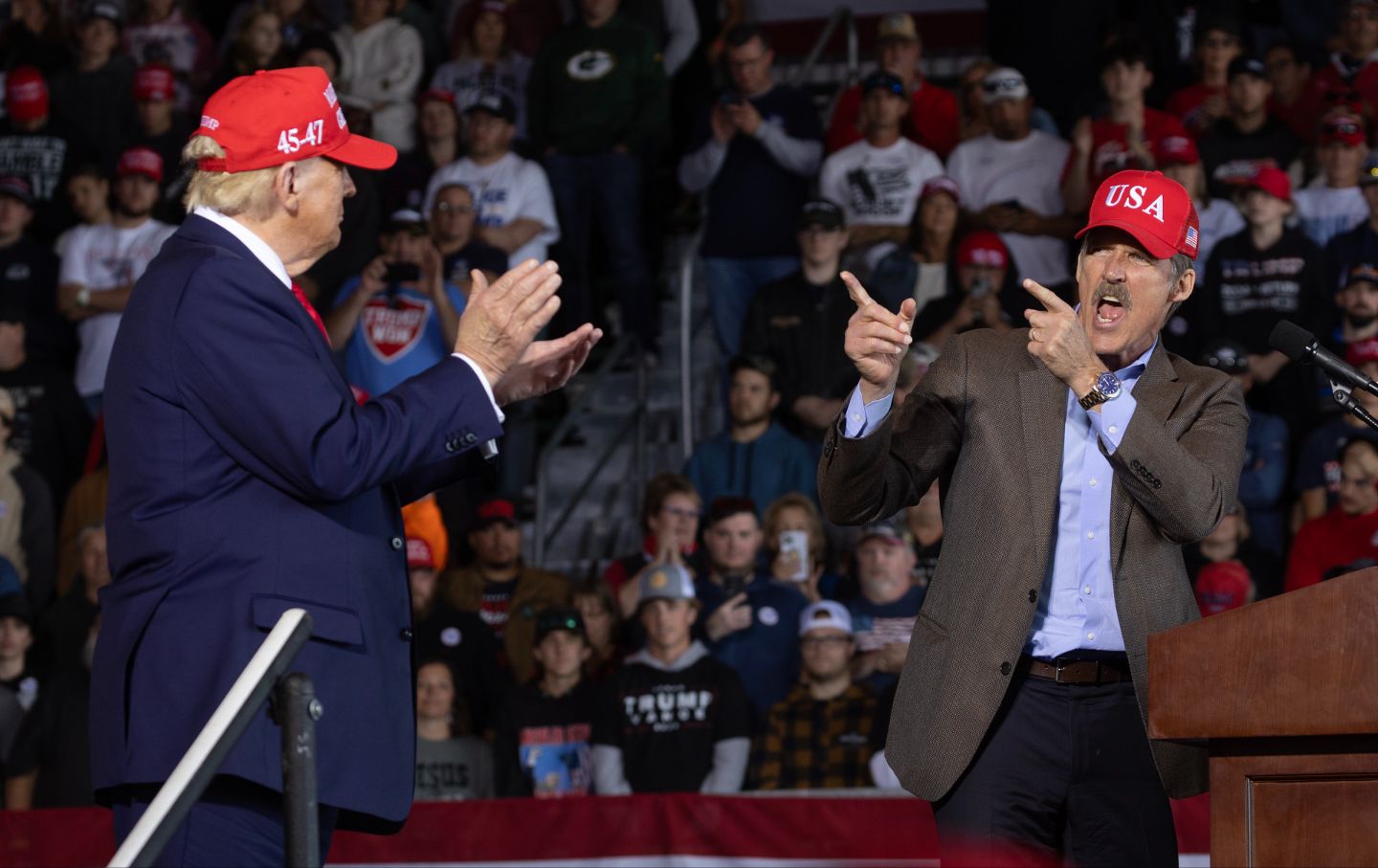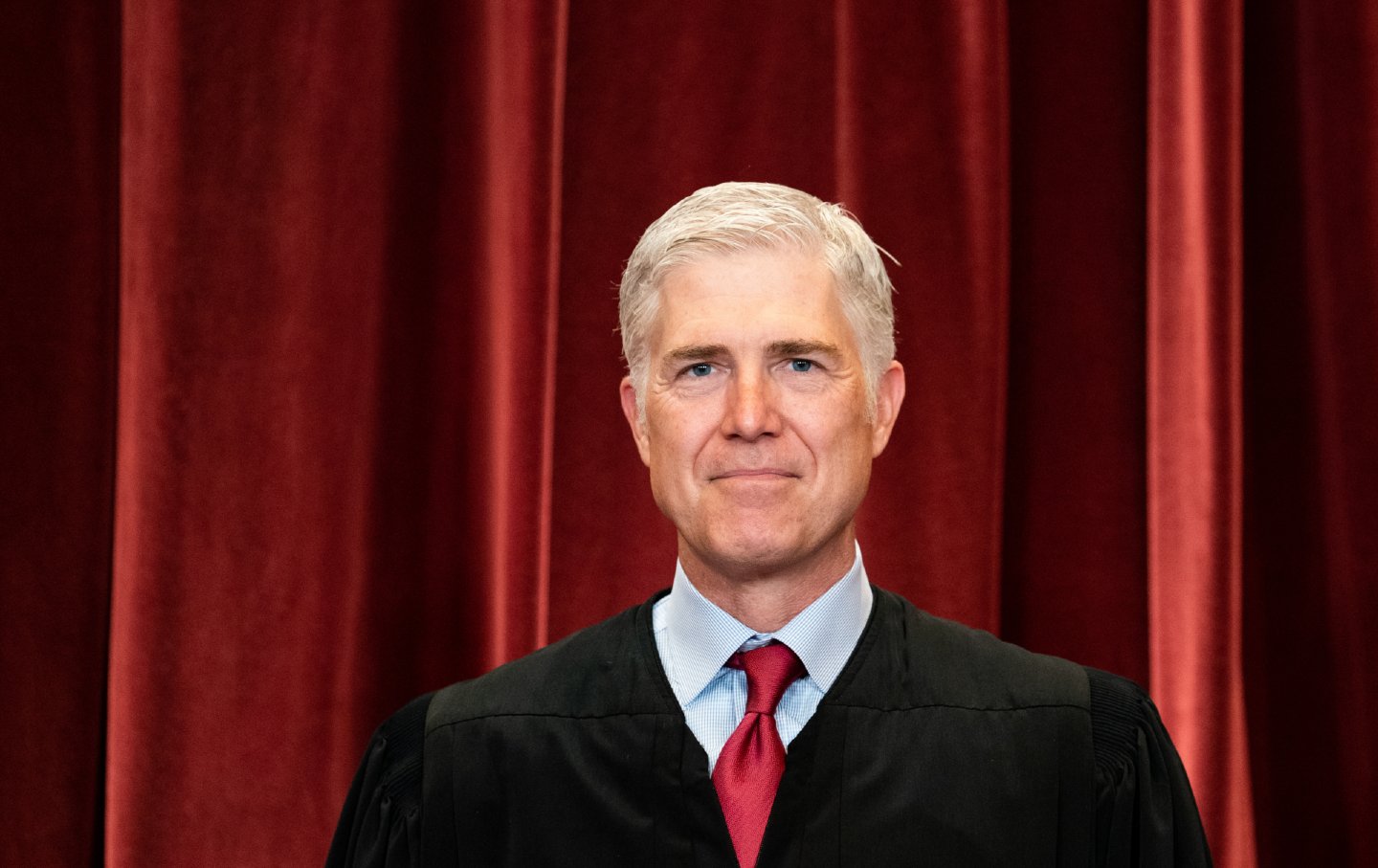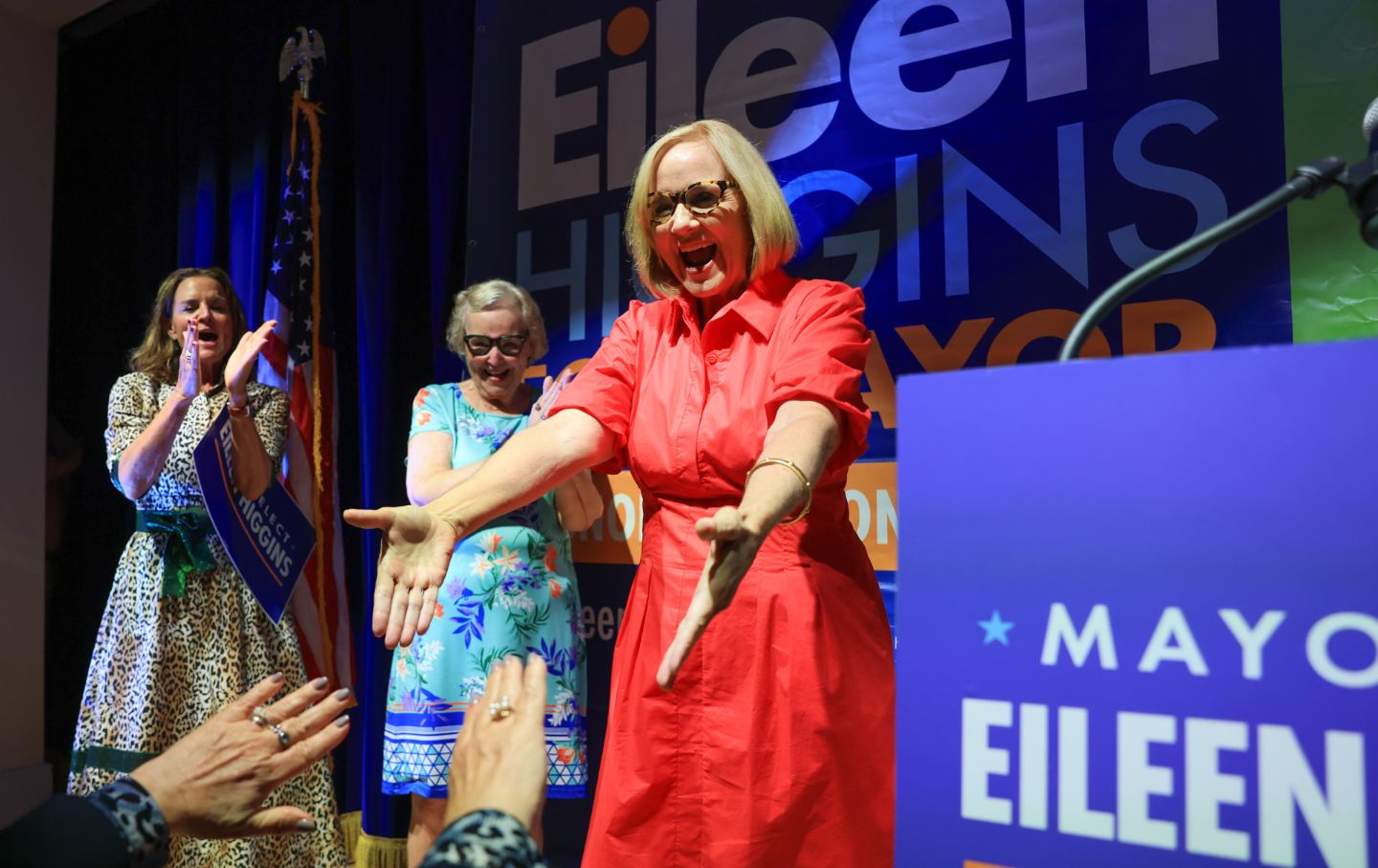Wisconsin’s GOP Senate Candidate Has Made a Massive Blunder
Tammy Baldwin’s rival stumbled on an issue that matters—a lot—to the state’s large base of rural voters. That could tip a key race.

Donald Trump listens as GOP candidate for the US Senate for Wisconsin Eric Hovde speaks during a rally at Dodge County Airport on October 6, 2024, in Juneau, Wisconsin.
(Scott Olson / Getty Images)
Republicans had a strategy for winning control of the US Senate this year: recruit millionaires and billionaires to take on vulnerable Democratic incumbents, hand those inexperienced contenders their talking points, and let the money do the rest.
In Wisconsin, the nation’s ultimate battleground state, Senate minority leader Mitch McConnell (R-KY) and his conservative allies thought they had hit the jackpot with Eric Hovde, a California banker who had roots in the state and very deep pockets. Unfortunately, no one told Hovde that, in order to win, he’d need at least a passing familiarity with the issues that matter to Wisconsinites.
That failure on the part of the Republican candidate has tripped him up repeatedly in his attempt to unseat Democratic incumbent Tammy Baldwin. And, last week, it resulted in one of the most embarrassing debate performances of the 2024 campaign season, as Hovde openly acknowledged that he was not up to speed on farm policy in a state that hails itself as “American’s Dairyland” and where durable-foam cheeseheads are proudly worn by voters of all political persuasions—including the state’s delegations to this summer’s Democratic and Republican national conventions (the latter of which was held in Milwaukee).
Wisconsin’s 2024 Senate race is one of a handful of contests that will determine which party controls the chamber that confirms cabinet members and Supreme Court picks and decides whether presidents will govern boldly or serve as lame ducks.
Democrats currently hold a narrow 51-49 majority in the Senate, and they are almost certain to lose former Democrat Joe Manchin’s seat in West Virginia. If they lose another seat and fail to pick up a seat from a vulnerable Republican (like that of Texas Senator Ted Cruz), the majority will tip to the party of Donald Trump.
While Baldwin, a progressive with deep roots in the state, maintains a small polling advantage over Hovde, The Cook Political Report recently ranked the race as a toss-up. Hovde, the owner, chairman, and CEO of a California bank that’s valued at $3.2 billion, has for many years maintained a posh residence on the Pacific coast in Laguna Beach. Despite taking hits for those California ties, the Republican has made himself a competitor by spending lavishly from his own fortune and surfing a wave of funding from political action committees aligned with billionaire campaign donors, corporate interests, and McConnell. Even when Hovde stumbled badly—by suggesting, for instance, that “if you’re in a nursing home, you only have a five, six months life expectancy” and claiming that “almost nobody in a nursing home is at a point to vote”—he remained in the running.
But as the Wisconsin race enters its final two weeks, Hovde has bungled an issue that, while it may not excite presidential-debate moderators, matters more in Wisconsin than most states: farming.
When Baldwin and Hovde debated on statewide television last Friday night, they were asked about their positions on everything from abortion rights to immigration. Baldwin, a former state legislator and member of the US House of Representatives who has long been recognized as one of the hardest-working senators in Washington, gave detailed answers to the questions. Hovde, for the most part, repeated the standard talking points developed by national Republican strategists in DC for the party’s millionaire candidates.
But, when it came to farm and rural issues, the Republican was caught flat-footed. Asked about the stalled federal farm bill—a definitional measure for agricultural and food policy, rural development, and hunger programs—Hovde effectively admitted that he hadn’t bothered to consider the legislation.
“I’m not an expert on the farm bill because I’m not in the US Senate at this point in time,” Hovde mumbled. “So, I can’t opine specifically on all aspects of the farm bill.”
That was a devastatingly bad response for a candidate who stands accused of returning to Wisconsin primarily to fuel his political ambitions. On top of confirming a general sense that Hovde is ill-prepared to represent Wisconsin, it reinforced concerns about past statements from the candidate that were widely interpreted as having disparaged farmers.
Baldwin saw her opening and she seized it, explaining the nuances of the debate about the farm bill, her decades-long commitment to rural Wisconsin, and the prospect that Hovde’s proposals for budget cuts could gut federal support for the Department of Agriculture. She also noted that this year she has received the endorsement of the Wisconsin Farm Bureau Federation—a group that historically has backed Republicans in key statewide races.
The exchange immediately made waves. Dan Bice, a veteran columnist for the Milwaukee Journal Sentinel called Hovde’s acknowledgment of his farm-bill ignorance the “worst moment” of the debate. And, remarkably, Hovde doubled down on his embarrassment, griping on a conservative talk-radio program about the fact that “I’m supposed to have studied [the Farm Bill]?”
Could Hovde’s worst moment translate into political trouble for the Republican? Democrats think so.
While this year’s Senate races have been “nationalized” in many senses, there are still local and regional issues that can influence outcomes in these contests.
That’s especially true when it comes to policies of concern to the farmers and small-town residents of Wisconsin, a state where agriculture remains a driving force in the economy.
Popular
“swipe left below to view more authors”Swipe →Wisconsin produces more specialty cheeses than any other state in the country. With roughly 5,500 dairy farms—and more than 1.2 million cows—Wisconsin farmers, coops, and cheese factories are responsible for over 600 types, styles and varieties of cheese, according to the Wisconsin Department of Agriculture, Trade and Consumer Protection.
But Wisconsin is more than just America’s Dairyland. It is the nation’s top producer of cranberries, ginseng, snap beans for processing, corn for silage, and much more. Indeed, according to the state, agriculture contributes $104.8 billion annually to the Wisconsin economy and is responsible for 435,700 jobs—11.8 percent of the state’s workforce.
Much, though certainly not all, of that workforce comes from rural counties that are often neglected by federal politicians. Even the most inept Wisconsin politicians generally try to feign interest in the issues that matter to rural and small-town voters in a state where the rural vote can decide elections. That’s especially true for Republicans who rely on support from rural Wisconsin to offset high turnout for Democrats in Madison, Milwaukee, and other cities.
But when Republican candidates step in it on rural issues, that can tip the statewide balance to the Democrats.
Hovde has stepped in it. And that doesn’t just help Tammy Baldwin. It gives Democrats a needed boost in their fight to retain control of the US Senate.
Disobey authoritarians, support The Nation
Over the past year you’ve read Nation writers like Elie Mystal, Kaveh Akbar, John Nichols, Joan Walsh, Bryce Covert, Dave Zirin, Jeet Heer, Michael T. Klare, Katha Pollitt, Amy Littlefield, Gregg Gonsalves, and Sasha Abramsky take on the Trump family’s corruption, set the record straight about Robert F. Kennedy Jr.’s catastrophic Make America Healthy Again movement, survey the fallout and human cost of the DOGE wrecking ball, anticipate the Supreme Court’s dangerous antidemocratic rulings, and amplify successful tactics of resistance on the streets and in Congress.
We publish these stories because when members of our communities are being abducted, household debt is climbing, and AI data centers are causing water and electricity shortages, we have a duty as journalists to do all we can to inform the public.
In 2026, our aim is to do more than ever before—but we need your support to make that happen.
Through December 31, a generous donor will match all donations up to $75,000. That means that your contribution will be doubled, dollar for dollar. If we hit the full match, we’ll be starting 2026 with $150,000 to invest in the stories that impact real people’s lives—the kinds of stories that billionaire-owned, corporate-backed outlets aren’t covering.
With your support, our team will publish major stories that the president and his allies won’t want you to read. We’ll cover the emerging military-tech industrial complex and matters of war, peace, and surveillance, as well as the affordability crisis, hunger, housing, healthcare, the environment, attacks on reproductive rights, and much more. At the same time, we’ll imagine alternatives to Trumpian rule and uplift efforts to create a better world, here and now.
While your gift has twice the impact, I’m asking you to support The Nation with a donation today. You’ll empower the journalists, editors, and fact-checkers best equipped to hold this authoritarian administration to account.
I hope you won’t miss this moment—donate to The Nation today.
Onward,
Katrina vanden Heuvel
Editor and publisher, The Nation
More from The Nation


The Supreme Court Has a Serial Killer Problem The Supreme Court Has a Serial Killer Problem
In this week's Elie v. U.S., The Nation’s justice correspondent recaps a major death penalty case that came before the high court as well as the shenanigans of a man who’s angling...

Corporate Democrats Are Foolishly Surrendering the AI Fight Corporate Democrats Are Foolishly Surrendering the AI Fight
Voters want the party to get tough on the industry. But Democratic leaders are following the money instead.

Marching Against a Corrupt Regime Marching Against a Corrupt Regime
People taking to the streets for democracy.

It Would Be Madness to Give Trump and His Toadies Even More Power It Would Be Madness to Give Trump and His Toadies Even More Power
And yet, that’s what the Supreme Court appears prepared to do.

Trump Is Dragging Republicans to Crushing Defeat After Crushing Defeat Trump Is Dragging Republicans to Crushing Defeat After Crushing Defeat
The president is deeply unpopular, his policies are failing, and Republicans are losing—everywhere.


